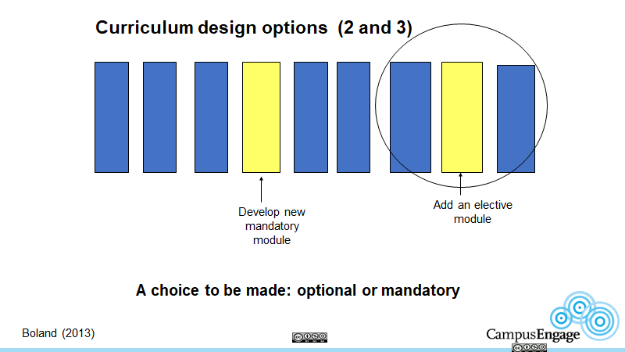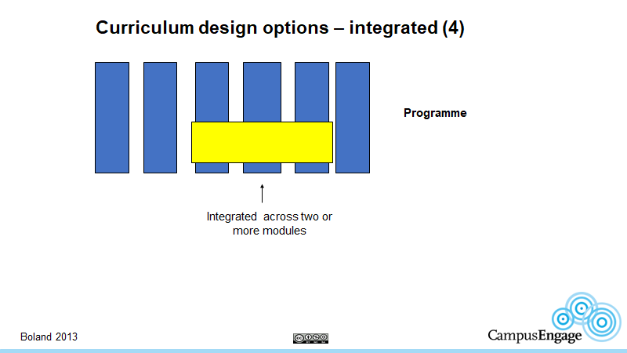In This Section
- CIRTL Homepage
- Meet our Team
- Resources
- Short Guides
- Short Guide 1: Starting Well
- Short Guide 2: Scaffolding Learning
- Short Guide 3: Icebreakers
- Short Guide 5: Discussions for Online Learning
- Short Guide 4: Visualising Thinking
- Short Guide 6: Universal Design for Learning
- Short Guide 7: Group Work
- Short Guide 8: Reimagining Practicals
- Short Guide 9: Assessment in the Age of AI
- Sustainable Development Goals Toolkit
- Group Work
- Connected Curriculum
- Civic Engagement Toolkit
- Learning Outcomes
- DigiEd Reading List
- Ethical Use of GenAI Toolkit
- Short Guides
- Professional Development
- Events
Curriculum Design Options for CEL

This Practice Insight provides an overview of the curriculum options you have for integrating civic engagement into your teaching. The focus you select depends on several factors, such as whether you are in a position to make significant programmatic or module changes and your personal preference for engagement initiatives; some initiatives may not require significant adaptations.
Module and Programme Level
The most popular way to integrate CEL into teaching approaches is through creating a new elective module or adapting existing core or elective modules. Changes at programme level are less popular as they are not as easy to accomplish especially for some disciplines where there is no history of community engagement.
Dr Josephine Boland, in an Open Access book chapter entitled, ‘Curriculum Development for Sustainable Civic Engagement’ presents a range of curriculum design options for staff interested in adopting a CE approach. Josephine details the options, from integrating CE into an entire programme to purposely creating an elective module that centres around a CEL approach. Figures 1 and 2 illustrate some of the examples put forward by Dr Boland.
Figure 1: Develop a new mandatory module or create an elective module

Figure 2: Incorporate civic engagement in a few modules within one programme

Although curriculum changes at programme level are less straight forward than at module level, the above guidelines can be useful for times when you are working with colleagues to reimagine existing programmes or create new ones.
As a programme team, you can brainstorm the development of, for example, standalone CEL modules or your options for embedding CEL across the entire programme. Nevertheless, whether at module or programme level, becoming familiar with curriculum design options is part of civic engagement professional development and should help you form a more comprehensive picture of how you can continue to grow as a civic engagement practitioner.
Updating the Book of Modules
It’s important to zone in on curriculum changes that impact the Book of Modules. Maybe you have been integrating Civic Engagement into your modules and programmes but have not made formal changes to any module descriptors. There are several reasons why you should make adaptations to your module descriptor but more importantly, reviewing the descriptor will give you the flexibility to roll out your preferred CEL approach.
Without amending the module’s learning outcomes and the corresponding assessments, you will be very limited in what you can accomplish in relation to your CEL approach. Students strongly engage with the Book of Modules and rely on the module descriptors for information relating to course content, learning outcomes and assessments. Once you are at a point where the learning outcomes and assessment strategy no longer reflect what you wish to accomplish through your CEL activities, then it is time to make the changes in your module descriptors by following the University procedures for making minor or major module changes. Students will then have an accurate understanding of the module and what is expected of them.
Naming civic engagement and encompassing terminology in the Book of Modules signals that you are, for example, actualising Priority 1 of the Academic Strategy, The Connected Curriculum, and aligning with CE targets as set by your School or College. Explicitly outlining your CEL approach in your Book of Modules can also be a useful source of evidence when applying for promotion as civic and community engagement is part of the University’s criteria for promotion.
If you have an established and familiar relationship with your proposed community partner, you could get together to examine the existing module descriptor. What adaptations need to be made so that the new module descriptor accurately reflects your proposed CEL initiative? You might start out with proposing minor changes for the earlier CEL iterations but together with your community partner (if appropriate) make major changes that reflect the realities of the CEL approach you have successfully integrated into your module.
In Practice
In October 2020 Cork International Film Festival (CIFF) together with Department of Digital Humanities and Department of Film and Screen Media at UCC launched the CIFF Digital Archive. Much of the work was completed by Cecilia Kareem, a graduate of the MA in Digital Humanities at UCC, as well as undergraduates enrolled in CK118, UCC's BA in Digital Humanities & Information Technology. The project is a demonstration of what can be achieved by undergraduates through community-engaged, collaborative projects.
Further Reading
- Boland, J. (2013) ‘Curriculum development for sustainable civic engagement’ in Farrell, A and O’Farrell, C. Emerging Issues in Higher Education. From Capacity Building to Sustainability Dublin: Educational Developers In Ireland.
- University College London an international leader in community engaged learning, have proposed ‘Five steps to developing a Community Engaged Learning programme, module or project’ which include guidance on how to build in assessment to CEL approaches.
- For more in-depth reading, Heffernan developed the much cited Six Models for Service Learning Courses in a book entitled “Fundamentals of Service Learning Course Construction”. In understanding these 6 models, you will be able to construct a CEL module reflective of your learning goals and source appropriate teaching strategies.
For more on this story contact:
This Practice Insight is published as part of the CE Toolkit for embedding civic and community engagement in the curriculum. Discover more about How to Learn with Communities.
Follow Department of Digital Arts and Humanities on Twitter @UCC_DH.
Follow Department of Film and Screen Media on Twitter @uccFilmStudies.
